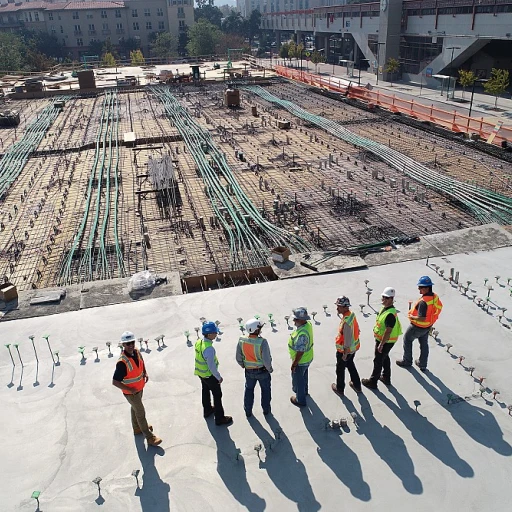Understanding Adaptive Leadership
The Essence of Adaptive Leadership
As organizations navigate an ever-evolving landscape, adaptive leadership emerges as a vital approach in dealing with change and uncertainty. Unlike traditional leadership styles, which often rely on static techniques, adaptive leadership requires leaders to be dynamic, flexible, and open to continuous learning. Adaptive leaders focus on the art of problem-solving through collaboration and empowerment. They acknowledge that today’s challenges typically transcend technical solutions and necessitate a complex mix of emotional intelligence, creativity, and shared leadership. By fostering a culture that embraces continuous learning and growth mindsets, adaptive leaders enable their teams to thrive amidst the challenges. Adaptive work is about focusing beyond technical challenges, and engaging team members to find innovative strategies to address adaptive challenges. This approach not only enhances decision-making but also encourages buy-in and commitment from all levels of the organization. In the world of adaptive leadership, one crucial part is navigating uncertainty. Leaders prepare themselves and their teams for potential change by creating an environment where everyone feels comfortable acknowledging their challenges and exploring strategies. Reflecting on real-life applications of this leadership framework (discussed later), organizations have seen transformative success. Exploring the growth and development within teams, adaptive leadership reshapes how leaders work with teams, encouraging a shared responsibility in achieving organizational goals. Readers who are eager to explore how adaptive leadership can help them thrive amidst change should check out the insights here thriving as a leader amidst change for guidance on how leaders can navigate through the complexities of modern business environments. Adaptive leadership is not just a leadership style; it is an approach that equips organizations to embrace changes with agility and resilience. As we delve further into real-world applications and outcomes, it's clear that this approach is pivotal in positioning organizations for success in the present and future.Case Studies: Real-world Applications
Real-World Examples of Adaptive Leadership in Action
Adaptive leadership is more than just a theoretical concept – it’s a practical approach that has successfully driven transformative change across various organizations. We can see its impact in numerous case studies showcasing how leaders navigate challenging environments through adaptability, collaboration, and emotional intelligence. One significant example comes from a global tech company faced with rapid market changes and shifting customer demands. The organization realized that traditional technical approaches were no longer sufficient. By adopting an adaptive leadership style, they reshaped their organizational culture to prioritize innovation and empower team members to voice ideas. This shift enabled them to tackle adaptive challenges head-on while fostering a business environment that encouraged continuous learning and embraced uncertainty. Another illustration can be found in the healthcare sector, where adaptive leaders worked tirelessly to address technical challenges and improve patient care. Through shared leadership and problem solving, teams cultivated an environment that values diverse perspectives. By implementing adaptive strategies, the organization effectively responded to emerging challenges adaptive in nature, thereby enhancing overall service delivery. Companies in the retail industry have also benefited significantly from incorporating adaptive work into their operations. Leaders in this field emphasize the importance of staying agile and responsive to market changes. By cultivating a growth mindset among employees and focusing on decision making that considers long-term impacts, these organizations have not only survived but thrived amid economic fluctuations. These real-world examples show the remarkable capacity of adaptive leaders to steer their teams through hurdles that demand more than just technical solutions. The adaptive leadership framework proves vital in creating an environment conducive to innovation, collaboration, and successful change management. For insights on enhancing your leadership style and achieving success, explore how to improve your leadership style for success, a resourceful guide to tailoring leadership approaches to fit evolving business landscapes.Positive Outcomes: What Organizations Achieved
Organizational Achievements Through Adaptive Leadership
When businesses embrace adaptive leadership, they can achieve remarkable outcomes. This leadership framework helps organizations face challenges head-on and encourages continuous growth and improvement. By focusing on adaptive challenges rather than technical problems alone, leaders can effectively guide their teams through periods of uncertainty and change.
Adaptive leaders excel at fostering a culture of shared leadership. This approach empowers team members to take ownership of their work and encourages a sense of responsibility across all levels of the organization. As a result, companies often see improved decision making, enhanced problem-solving skills, and a more motivated workforce.
Organizations that adopt these adaptive strategies also report increased business resilience. Leaders who are adept at navigating change and handling adaptive challenges enable their teams to rapidly adjust to new circumstances, ensuring that the business remains competitive even in volatile environments. This resilience is bolstered by an emphasis on emotional intelligence, which helps leaders to connect with people on a meaningful level and manage the emotional dynamics within their teams effectively.
Moreover, adaptive leadership promotes a growth mindset among team members. This mindset encourages individuals to embrace learning opportunities, view challenges as avenues for development, and remain open to innovative solutions. By creating an environment where learning and adaptability are prioritized, companies cultivate a workforce that is better prepared to face future challenges.
Testimonials: Voices from the Field
Voices of Experience: Insights from the Field
In the realm of leadership, nothing speaks louder than the voices of those who have navigated the complexities of adaptive leadership firsthand. These testimonials provide a window into the real-world application of adaptive strategies and the profound impact they have on organizations and teams.
One leader shared how embracing an adaptive leadership style transformed their organization’s culture. Faced with significant technical challenges, they realized the importance of fostering a growth mindset among team members. By encouraging continuous learning and shared leadership, they were able to navigate uncertainty and drive meaningful change. This approach not only enhanced problem solving but also cultivated a more resilient and engaged workforce.
Another testimony highlighted the role of emotional intelligence in adaptive leadership. A leader recounted how understanding and managing emotions was crucial when dealing with adaptive challenges. By prioritizing emotional intelligence, they built stronger relationships within their team, which in turn improved decision making and facilitated smoother transitions during periods of change.
Adaptive leaders also emphasized the significance of flexibility and creativity. One leader noted that adaptive work often requires moving away from traditional technical solutions and instead embracing innovative strategies. This shift in mindset allowed their organization to remain agile and responsive in a rapidly changing business environment.
These testimonials underscore the vital role of adaptive leadership in today’s world. As leaders continue to face complex challenges, the insights gained from these experiences offer valuable lessons for those looking to refine their leadership framework and drive success within their own organizations.







